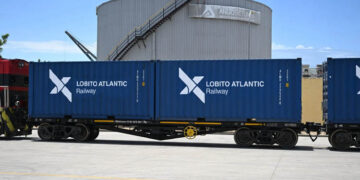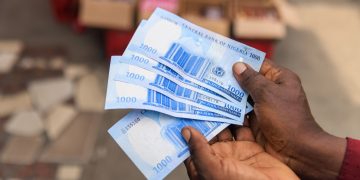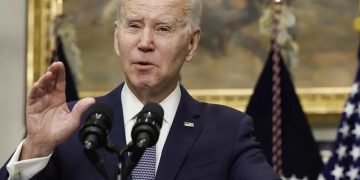The Goldenberg scandal in the early 1990s is Kenya’s largest documented gold fraud. The scheme involved Goldenberg International Limited, which pretended to export gold and diamonds, and in exchange received substantial subsidies from the government for “earning” foreign exchange. Kenyan businessman Kamlesh Pattni – who was at the centre of the scandal and was charged with fraud but eventually acquitted – was recently named in a new investigation into gold fraud. This time his operation is allegedly being run through Zimbabwe from his base in Dubai. Economists Roman Grynberg and Fwasa Singogo, who have researched the Goldenberg case, and the gold mining industry and its role in illicit financial flows in Africa, unpack the issue.
What was the Goldenberg scandal?
The scandal centred on two companies: Goldenberg International and Exchange Bank Limited. Both were owned and directed by businessman Kamlesh Pattni and his partner James Kanyotu, the director of intelligence in the Kenyan police force. The two were licensed by the government to export gold and diamonds from Kenya. But they did not. They just collected an inflated subsidy.
The Goldenberg scandal occurred at a time of severe economic austerity in Kenya in the early 1990s. The country’s economy was characterised by long periods of macroeconomic instability and dwindling foreign reserves.
Economic policy was inward-looking. It leaned towards the protection of local industries and the retention of foreign exchange. This period also coincided with the one-party state that began in 1982 and was marked by political oppression.
As a result, donors gradually reduced support and investment evaporated. Foreign debt payments became irregular and the government increasingly fell back on local borrowing.
The Kenyan government turned to international financial institutions for cheaper loans. These were provided, but were conditional on economic reforms, such as measures intended to stimulate trade.
Coincidentally, or otherwise, Goldenberg International applied to the Kenyan government in July 1990 for certain privileges that spoke directly to the economic needs of the country. The company received a monopoly on exports of gold and diamonds from Kenya.
It was also given a subsidy of 35% of the value of these exports – 15% more than the official rate at the time.
Goldenberg managed to defraud the Kenyan state of between US$600 million and US$1.5 billion in subsidies. Subsidies can be direct (such as cash payments) or indirect (such as tax breaks). Goldenberg’s subsidy was in monetary form, on condition that the company proved foreign exchange gains through exporting non-traditional commodities.
The fraud was that Kenya had insignificant amounts of known gold deposits and absolutely no diamonds. Government officials authorised payments for fictitious exports.
Goldenberg’s main transactions were recorded between 1991 and 1993. The 2003 Judicial Commission of Inquiry into the scandal estimated that Goldenberg pilfered a total of KSh158.3 billion (US$2.3 billion at the time). However, the exact amount remains in the area of speculation.
What institutional gaps enabled the fraud?
The architects of the Goldenberg scandal abused a number of trade policies. These included the Export Compensation Act, Pre-shipment Finance and the Retention Scheme.
There’s inherently nothing wrong with these measures, which are intended to stimulate trade. But they were implemented in the context of a corrupt political system and became instruments of fraud.
Another significant aspect of the fraud was Kenya’s exchange rate system. The difference between official and parallel exchange rates, and the depreciating Kenyan shilling, allowed Goldenberg to earn illegal returns on foreign exchange.
Cheque kiting is another tool that was used. It’s a form of cheque fraud that utilises the time it takes for a cheque to clear to use non-existent money in an account.
Officials at the highest levels of government were heavily involved in authorising payments to Goldenberg.
Under the rules to obtain subsidies, Goldenberg had to get signatories from the customs department that exports had occurred; from the Central Bank of Kenya that revenue had arrived; from the ministry of minerals that production had occurred; and from the ministry of finance for final authorisation.
As was alleged in a recent Al-Jazeera exposé on gold fraud in Zimbabwe, where Pattni’s name has featured, corrupt and well-paid senior government officials in Kenya played a part in the plunder of the nation during the Goldenberg years.
An audit ordered by the International Monetary Fund and World Bank into cheque kiting and forex fraud in April 1993 sparked the unravelling of the Goldenberg scandal.
No one ever went to jail for this grand fraud despite years of inquiry and the prosecution of some of the parties involved.
What was the cost to Kenya?
The government of Kenya received no benefit as there were no official export earnings from the sale of gold and diamonds.
There are no reliable estimates as to the scandal’s effect on Kenyans to date, largely because the payments made and money siphoned couldn’t be easily accounted for.
What are the lessons learned?
The judges in the judicial review of the Goldenberg scandal blamed the International Monetary Fund and World Bank for setting the context that enabled the abuse of subsidies.
In a world where more people and nations are subject to sanctions if they trade in US dollars, gold has become a way to evade economic restrictions. It isn’t easily detected in developed country jurisdictions. For instance, since 2019, trade in gold in Venezuela and Iran has increased drastically with Turkey despite US sanctions.
The use of physical gold traded through a country like the United Arab Emirates – Pattni now operates out of Dubai – evades the financial sanctions imposed on nations like Zimbabwe.
Regulatory frameworks governing trade in gold are weaker than the ones governing the entry of US dollars into the global banking system. To address this, the international community must put pressure on secrecy jurisdictions to align their gold trade and anti-money laundering regulatory frameworks with global best practices.
Both Kenya and Zimbabwe have had long reputations of being politically risky, mired in corruption and having unsound policies. Political connections are also important in doing business.
Deliberate and continuous efforts to curb corruption, have stable and sound policies, and establish solid independent institutions are needed for these countries to have some semblance of accountability. If not curbed, the systemic greed of the political elite and those politically connected will continue to lead countries into ruin and citizens to destitution. Competing limited resources will continue to end up in the pockets of a select few and not cater to the public good so often championed in policy pronouncements.![]()
Roman Grynberg is adjunct professor, Griffith University and Fwasa K Singogo is research associate, Indaba Agricultural Policy Research Institute (IAPRI)
This article is republished from The Conversation under a Creative Commons license. Read the original article.



















![[Kenya] Digital credit provider Tala disbursed Sh240 billion in loans in eight years 19 [Kenya] Digital credit provider Tala disbursed Sh240 billion in loans in eight years](https://theafricanbusiness.com/wp-content/uploads/2023/02/TALA-APP-360x180.jpg)













